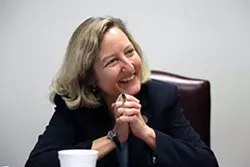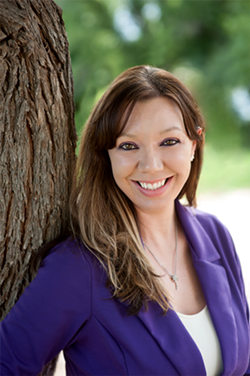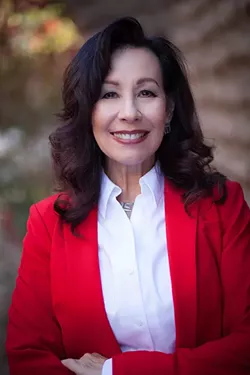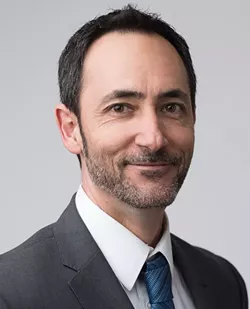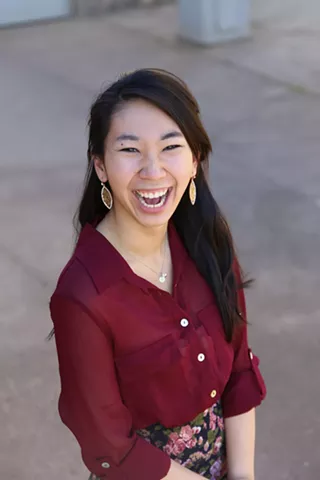Tucson's Legislative District 10 is a rarity in state politics: A competitive district that could go either way in a general election.
You need no more proof than Republican Todd Clodfelter's win two years ago, when voters in the midtown district—which stretches east from midtown Tucson more or less south of Speedway and north of 22nd Street all the way to Vail on the east—rejected an incumbent Democrat, Stefanie Mach, in a race that was decided by 857 votes.
Democrats are out to reclaim the seat this year—and since 37 percent of the voters are Democrats, 32 percent are Republicans and 30 percent are independents, they think they have a pretty good shot. First, four Democrats are squaring off in the Aug. 28 Democratic primary for the two House seats: incumbent Rep. Kirsten Engel, a UA law professor who is wrapping her freshman term; Nikki Lee, an Air Force veteran who has been active in education politics; Catherine Ripley, a Navy veteran who is now teaching at Pima Community College; and Domingo DeGrazia, an attorney and the son of legendary local artist Ted DeGrazia.
Kirsten Engel: "I haven't finished what I set out to do"
Now that Rep. Kirsten Engel has legislative experience and adjusted to the political environment at the Arizona House of Representatives, she says she can be more effective this upcoming session.
"I haven't finished what I set out to do," the incumbent said.
Engel settled in Tucson with her husband and daughter in 2005. She is a co-director at the UA's Environmental Law Program where she also teaches and researches environmental and administrative law.
Engel has held teaching positions at Tulane, Berkley, Vanderbilt and Harvard Law Schools. She has published numerous books and scholarly articles since 1988.
She graduated magna cum laude from Brown University and went on to Northwestern University School of Law.
Engel was elected in 2016, along with Clodfelter. If re-elected, her top priority will be to continue fighting for public education support and working to draw it from various revenue sources. To do that, she proposes generating more money through raising corporate tax rates, closing sales tax loopholes that exempt particular industries, taxing online sales from out-of-state companies and implementing service taxes.
Engel said that Ducey's latest education budget, which grew drastically in response to the Red for Ed movement, is "below what is minimally adequate for funding our schools" because it does not restore finances to pre-recession levels. She also says that educational staff—such as librarians and counselors—who were left out of the teacher raises deserve a salary bump, too.
"We have so many educators and staff who are part of the education system that need to be also rewarded for their hard work," Engel said. "A lot of districts are not limiting [pay raises] to the class of teachers that the plan was based on."
This year, Engel served as one of the Democratic leaders on both the Judiciary and Public Safety committee and had a seat on the Energy, Environment and Natural Resources committee. She anticipates that water will become a hot topic of debate next legislative session due to the ongoing drought and Gov. Doug Ducey's call for a reform of water law. She says her background in environmental law will help her better guide alternatives, such as pushing for smarter agriculture practices since farmers are one of Arizona's largest users.
Engel also wants to advocate for criminal justice reform by bringing attention to private prison safety, staff training and prisoner provisions through the bipartisan study group she co-sponsored with nine other policymakers. They will submit their findings and recommendations by Dec. 31 to the governor's office, the speaker of the House and the Senate president for review.
Engel said the study group led the charge to defeat a bill that mandated a minimum 10- to 15-year sentence for drug possession. In 2017, the state allocated $1 billion—or one-ninth of the state budget—to The Department of Corrections.
"Reforming our prison system, especially sentencing reform, would be good for the families and individuals caught up in that system and can save money in our budget that we can use for other things, like education," Engel said.
Nikki Lee: "You have to answer the calling"
Nikki Lee says the call to serve is "in her DNA" and that representing LD 10 would be natural extension of that calling. Lee says she initially wanted nothing to do with politics. However, after she got out of the Air Force in 2005, she had a change of heart.
"I tried to stay away from it because it can be really nasty, and it's not always a fun thing," she said. "But when your country or state needs you, you have to answer the calling."
Lee grew up as a minister's daughter in a conservative Iowa town and has lived in Tucson for 15 years. It was during her five-year service, followed by several years of civilian work with the US military in South Korea, Afghanistan and Iraq, that she formed the Democratic values she holds today.
"You can't help but be changed when convoying through Afghanistan and literally see people living in mud huts," Lee said.
She received her MBA in information technology management from the American Military University two years ago and recently worked for an Iowa-based agriculture and environmental technology company, where she supervised a group of developers and engineers on conservation projects.
Lee believes her IT and software management expertise not only distinguishes her from the other candidates, but is also needed in the Arizona Legislature to expand renewable energy options. She likes to point out that her home runs completely on solar and wind power.
"We have a lot of opportunity, but if we don't have someone there [in the House] who truly understands technology, we can miss those opportunities," Lee said.
Veteran issues are also important to her, especially mental health treatment.
When a veteran friend committed suicide in 2016, Lee became involved in researching alternative treatment programs for veterans needing help, such as hyperbaric oxygen therapy to study brain damage reversal. She believes Arizona should invest more in organizations that provide services and resources to veterans.
Lee also advocates for everyone to have the same level of quality health care that she and her family receive through the VA, saying, "I will fight for that every day of my life."
Over the past few years, Lee has completed leadership training from Greater Tucson Leadership as well as Flinn-Brown Leadership Academy. She is confident in her ability to find common ground with people who have different political positions.
"I understand where people come from based on their value-based positions because I grew up in that environment," said Lee, recalling her upbringing in a conservative, rural town.
She is the only LD 10 candidate who chose to run as a Clean Elections candidate. The Citizens Clean Elections Commission gives qualifying legislature candidates $16,995 for primary elections once they receive at least 200 individual $5 donations from voters in their district. Lee said not having to worry about fundraising is liberating because it gives her ample time to connect with voters.
Last year, Lee was an organizer with Save Our Schools Arizona and worked to get the expansion of school vouchers on the November ballot for voters to decide.
Catherine Ripley: "I'm used to working with opposition"
Catherine Ripley is running for Arizona legislature for two reasons: To create a better future for her two adult children and because she believes her international relations experience makes her the best candidate to represent District 10.
Ripley is from Wolf Point, Montana, a community that sits on the Fort Peck Indian Reservation. She has lived in Arizona for almost a decade and performs around the city with her local bands, Blancato and Beyond Words.
Ripley graduated with a bachelor's degree in engineering and political science from the U.S. Naval Academy prior to earning a master's degree in National Security Affairs at the Naval Postgraduate School.
Ripley specialized in counter-terrorism work throughout her 26-year military career as a Navy officer. In the early 2000s, she accepted diplomat positions serving in military defense at American embassies in the Netherlands and Madagascar.
"I'm used to working with opposition, people of different ilk, and reaching successful conclusions and solutions," she said.
As a Naval attaché, Ripley negotiated with foreign and national agencies, including NATO allies, the U.S. Agency for International Development and the State Department.
Ripley applied her passions for health and education in Madagascar by gathering $1 million in U.S. federal funding to build, train and equip the first five HIV/AIDs clinics that treat and prevent spreading of the disease that affects 7.1 million people in Sub-Saharan Africa.
After moving to Tucson, she held a senior manager position with Raytheon's International Business Development for six years. Now, she teaches political science, the U.S. Constitution and global studies at Pima Community College.
Ripley wants use her diplomacy skills in the State House to collaborate with policymakers across the aisle to amend bills she thinks the Republicans handled "haphazardly," like Gov. Doug Ducey's Safe Arizona Schools plan.
Although Ripley believes the plan is a start for a broader discussion, she says it "lacked foresight" and doesn't tackle the root of the problem. If elected, she said she will advocate for a task force of experts from healthcare, law enforcement and government professions to create a comprehensive gun bill that addresses sales, possession, safety and certification similar to a driving test.
Domingo DeGrazia: "I'm completely OK with walking into a hostile environment"
If Domingo DeGrazia's name sounds familiar, it's because he's the fourth child of Southwestern artist Ettore "Ted" DeGrazia.
DeGrazia is the only LD10 Democratic candidate born and raised in Tucson. He spent his childhood riding in the back of a Suburban, attending pow wows and gatherings across Arizona with his Cherokee mother. Unlike his father, DeGrazia's not much of a painter but found his artistic passion as a Spanish and classical guitarist and composer.
DeGrazia has practiced family law since 2005, specializing in representing parents whose guardianship rights have been taken away by the state and are seeking reunification with their children. His support for keeping families together doesn't only apply to the clients he defends; it also pertains to refugees who request U.S. protection from the persecution they face in their country.
Though DeGrazia deems it "unconscionable" to separate children from parents during the asylum process, he said the situation is harder for those who cross illegally because they "have already broken the law and have less ability to ask to have their kids with them."
Over the years, he's negotiated with the Juvenile Court and Court of Appeals about the best outcomes for families and directed his clients to resources, "so that they can remedy parental deficiencies to become good parents and get their kids back." Based on his experience, DeGrazia said families aren't offered the preventative measures, like professional counseling, that he believes are needed to keep children from being unintentionally harmed.
"I'm completely OK with walking into a hostile environment because that is essentially my everyday work," DeGrazia said.
After earning his law degree and Master's in Aeronautical Science from Oklahoma City University, which he attended for its Native American law program, DeGrazia returned to Arizona and took a prosecuting position on the Ak-Chin Indian Reservation.
Expanding education revenue streams is DeGrazia's main priority because low funding chases away the best teachers, limits the opportunities available to students and makes it harder to fix roads and other infrastructure. In other words, he said, it hurts the economy, work force and future generations.
He also wants to invest more into early childhood education, arguing that quality instruction is vital to young children's developmental and learning trajectories for the rest of their lives. It's something DeGrazia thinks will benefit Tucson in the long-haul, better preparing the leaders of tomorrow.
"If we truly want to make America great...let's have the smartest people live here, work here and want to be here," he said.
Although DeGrazia hopes voters turn out to elect him in the primary, his own voting record is inconsistent. DeGrazia voted in his first local election in 2017, in his early 40s. Besides that, he only voted in the 2008, 2012 and 2016 presidential elections. But before that, he didn't cast a vote in Pima County since 1992.
DeGrazia admitted to not understanding the importance of local or national politics in the past. He claimed the reason his voting record has been so poor is because he was just starting his career and family when the economy collapse a decade ago.
"When Obama got elected, my task was to take care of my family, take care of my clients and essentially keep my head down [and] work as hard as I could in order to get out of that bad situation," he said.

